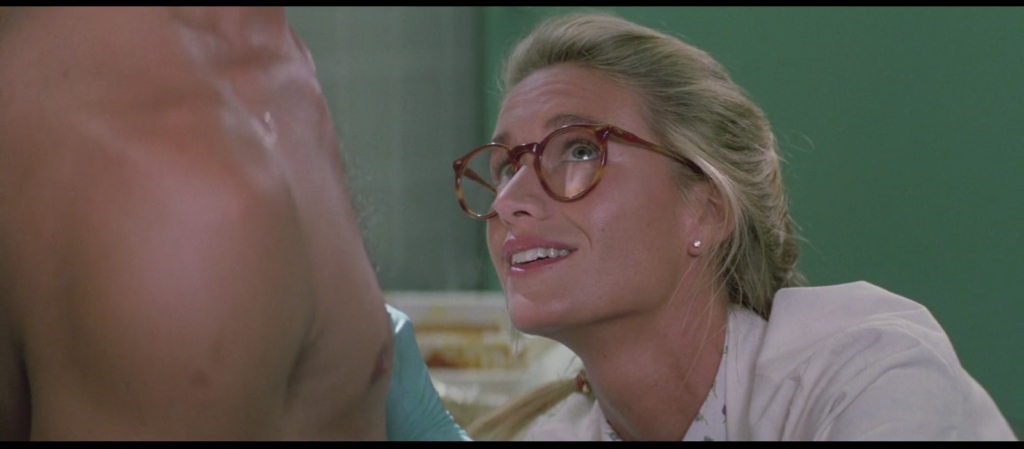If there’s one thing the Marvel/Netflix shows, even the ones I’m not crazy about, have been good at, it’s tying their superhero/vigilante violence to moments of physical intimacy. Sometimes this involves the main characters having sex, and from Jessica Jones and Luke Cage to Luke Cage and Misty Knight to Matt Murdock and Elektra Natchios, those scenes have been hot across the board. That’s certainly true on this show as well, from Agent Madani and Billy Russo to David “Micro” Lieberman and his wife Sarah to [the Punisher] and Beth the bartender just last episode.
At other times the violence itself is intimate. This naturally tends to be the case more for the characters who lack super-strength than for those who do, but it’s true. Watching mortal men like Matt Murdock and Frank Castle be made vulnerable by the infliction of violence on their bodies is a display of intimacy. To quote myself quoting Barbara Kruger regarding another show, “You construct intricate rituals which allow you to touch the skin of other men.” Hallway fights are an intricate ritual indeed.
And then there are the moments of triage that occur after the battle is over. I’m thinking Luke Cage tending to Misty Knight’s mangled arm for damn near an entire episode (overlong thanks to Netflix Bloat, but still notable), or Frank Castle and Karen Page leaning into each other in an elevator after spending an entire episode trying to avoid being murdered by a mentally ill gunman. In this case it’s “Rachel” (if that is her real name), the shifty fugitive Frank’s been protecting for two episodes, removing a slug from Frank’s right buttcheek. Earlier in the episode, it’s her taking his boot off for him when he proves unable to do it himself. You see the same principle at work when Daniel Craig hugs a crying Eva Green in the shower after a killing spree in Casino Royale, or when Bruce Willis has a heart to heart with Reginald Vel Johnson while he picks shards of glass out of his bare feet in Die Hard, or even when Patrick Swayze and Kelly Lynch meet cute while she staples a knife wound in his side in my beloved Road House. Sylvester Stallone, the actor who at his best most reminds me of what Jon Bernthal does, constructed two entire franchises around the idea that there’s something interesting about watching his perfect body get beaten to shit. Moments like this make the violence real and draw those of us who’ve never experienced such combat into the moment by reminding us we all share the same basic physical vehicle for navigating the world around us.
When I went searching for this quote I’d forgotten all about including Road House as an example of the tendency I’m discussing, but there you have it. The first thing Dr. Elizabeth Clay does with Dalton, after ribbing him for having gotten the shit kicked out of him over and over for years, is staple shut the gash in his side. She’s up close and personal for this, face inches away from armpit and chest hair and nipple. Often she looks up and grins at him, and if you’ve ever seen the phrase “slow smile” used in reference to a sexy person in a book and want an illustration of the concept, you’ve got one. I’m sure I don’t need to underline what the relative positioning of their heads suggests. I mean, this is a person who meets the man she will fall in love with for the first time when he’s shirtless and waiting for her to touch and heal his body. At this point she’s never seen him with a shirt. (Start as you mean to go on, I suppose.) And in the reverse, Dalton first sees the woman he’ll fall in love with when she’s approaching him to inject him with a needle and fire metal staples into his knife wound, a fate to which he stoically submits, other than that he rejects the needle and the dose of anesthesia that comes with it for reasons described in the title of this essay series.
To say that all of this supercharges their subsequent interactions with erotic intimacy is to understate the case considerably. I know people have mixed feelings about their sex scene but if you can watch their first couple of dates without wanting them to bang instantly you’re a stronger person than I am. It all begins here. So does the sexualization of Dalton’s mentor Wade Garrett, whose chemistry with the Doc is phosphorescent and who exposes his pubic hair to her in the course of revealing a scar given to him by a woman as part of their getting-to-know-you evening out as a threesome. I think there are even echoes, faint but audible, of the way Elizabeth looks at Dalton during this scene in how various men who either want to or will commit violence against Dalton look at him as well. When they finally do battle, Jimmy in particular will sexualize that violence.
Considering how resolutely un-sexy most of the bouncer-goon combat is in this film, to inject this pain-pleasure connection into the proceedings and have it pay off frequently moving forward is a minor miracle. Most action movies of the period were content with the corniest, fanserviciest, most sexist, least interesting ways of depicting sex. Road House has some thoughts in its head after all, and they’re kind of dirty.
Tags: dalton, elizabeth clay, pain don't hurt, road house, sex, the punisher

